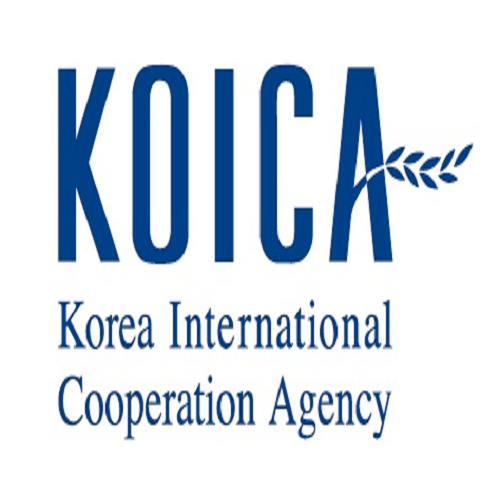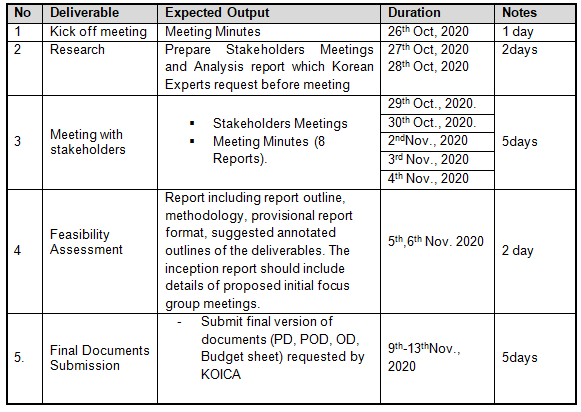Consultant Junior – KOICA عودة إلى الفرص
Agence Coréenne de Coopération Internationale (KOICA)
يطلق Appel à consultantsانتهاء الصلاحية
09 أكتوبر 2020 Il y a 5 ans
شروط الترشّح
أنقر هنا للاطّلاع على شروط الترشّحشارك الفرصة على
تفاصيل الفرصة
GENERAL INFORMATION
- Services/Work Description: Implementation of the “implementation survey” for the cooperation project between ILO and KOICA: Promotion of employment for Youth and Women in Tunisia (ICT basis)
- Duty Station: Tunis, Tunisia
- Type of the Contract: Short term contract (Junior Consultant)
- Duration: 1 5 working days
- Expected Start Date: 26th Oct, 13th Nov (15days)
BACKGROUND / RATIONALE
Data from Tunisia’s National Institute of Statistics indicate that tackling the unemployment crisis in Tunisia has eluded authorities for nine years because of the slow implementation of mechanisms to revitalize the labour market and lack of action in that regard.
The unemployment rate remained at the same level over the past nine years proves that labour market reforms have not mitigated the effects of austerity measures and cuts in public spending, subsidies, wages, fees and taxes imposed to address financial imbalances.
Tunisian authorities tried to break away from the weight of the old labour system, which was based on unqualified work forces. This factor, along with continuous political tensions, led to increased unemployment rates.
That is why international financial institutions stepped up pressure on Tunisia to accelerate control of unemployment rates and increasing growth in Tunisia’s weakened economy.
Despite various support programmes for the labour market by successive governments, many Tunisians said their conditions have worsened because of the rising unemployment rate, which has reached 18% (T2 2020). This rate was 11% in 2010.
Official statistics confirm that the unemployment gap widened in rural areas compared to cities and that the segment hit the hardest by unemployment is university graduates.
Specialists said there are structural factors keeping unemployment figures at their current levels. Such conditions will be difficult to address in the absence of a clear and structured vision guiding economic recovery.
Tunisian authorities have, in recent years, adopted various measures and initiatives to incentivize the private sector to employ more university graduates, given that the public sector was saturated. The measures, however, failed to achieve their goals.
The 2020 World Economic Forum ranked Tunisia 78th out of 180 countries on the unemployment index. That means it is very far from achieving its ambitions.
The objective of the cooperation project between ILO and KOICA: Promotion of employment for youth and women in Tunisia (ICT basis) is to enhance the accessibility to more decent work opportunities of Tunisian young women and men. As the second phase of the project “Decent Work for Youth and Women” in Tunisia, the project gives particular focus to strengthen the ecosystems for ICT related start-ups in 3 additional regions and support regional action plans of the National Employment Strategy (NES).
The main objective of the implementation survey is to discuss the possibility for cooperation in the below project and to finalize the project document.
The duration of the project will be from 2021 to 2024 with a grant worth of 4.35 million USD.
OBJECTIVES OF THE SERVICE / WORK
The objectives of this implementation survey are to:
- Discuss and develop the possibilities of the implementation of the project.
- Conduct an assessment and a review on Tunisian status and needs in terms of employment (especially Youth and Women) with a focus on ICT)
- Finalize the project document of the project.
SCOPE OF THE WORK / METHODOLOGY / APPROACH OF THE SERVICE
The Job Description of the consultancy is:
- Analyze and provide advisory about the survey to KOICA experts – conduct and assist field study activities based on demand of the Korean experts.
- Provide timely and necessary inputs needed for the survey.
- Analyze the Tunisian situation related to the employment and ICT sector: institutional aspects – private sector – coordination between stakeholders – …
- Organize and join meetings with stakeholders involved in the project and prepare the outputs of these meetings.
- Liaison between Korean and Tunisia experts / officials / stakeholders – Manage communication between KOICA study team and Tunisian counterpart ministries and related organizations.
- Establish and maintain the regular communication with Korean experts for survey implementation (online meetings / mailing / …)
- Co-develop with Korean experts the project documents which include Project Document (PD), Project Output Description (POD), Output Description (OD) and Budget Sheet (detailed budget for each project components) based on above mentioned comprehensive analysis with KOICA.
The Junior Consultant is expected to support the consultant to develop a study report which includes the following:
- Outline the proposed methodology and/or approach expected to be employed including the use of primary data or review and analysis of relevant secondary data sources.
- Review current literature and data on youth and women employment with a focus on ICT to identify and determine areas that may be suitable for project implementation.
- Provide in-dept analysis (SWOT) for the project implementation.
- Analysis of existing policies, and best practices for recommendations.
- Evaluate stakeholders and data provided by other programs/donors.
- Propose key recommendations.
The following activities will be undertaken:
- Initial meeting with a focus group: Initial focus group meeting/kick off meeting with KOICA, Korean experts and ILO to determine and discuss the parameters of the TOR and to review the scope of work.
- Desk review: The Junior Consultant will support the consultant to conduct desk review to learn about youth and women employment and ICT in Tunisia.
- Consultative meetings: Consult relevant stakeholders to find out how the issues concerning youth and women employment (with a focus on ICT) have been addressed and assess their views.
TENTATIVE TIME FRAME OF THE WORK / DELIVERABLES / OUTPUT
REPORTING / INSTITUTIONAL ARRANGEMENT
Within the framework of the present mandate, the Junior Consultant will support the consultant to:
- Produce a final report of the implementation survey (in English).
- Provide Korean experts with needed documents during the implementation of the mission.
The work will be guided under the auspices of KOICA Tunisia office. However, the Junior Consultant will be expected to actively work with the Korean Expert team.
Note: The above mentioned tasks to be performed are intended as a guide and should not be viewed as an inflexible specification as it may be modified following discussion with the selected Junior Consultant.
شروط الترشّح
- A minimum of 5 years of proven experience of working in employment sector (policy – diagnosis - …) and job creation
- Good experience in project management
- Good understanding of the ICT sector in Tunisia Strong experience in the organization/animation of multi-stakeholders meetings
- Strong experience in drafting Meeting Minutes in English
- Flexibility to adapt to any subsequent changes in the terms of reference
- Ability to provide general leadership and direction to the study/research analysis and report writing
- Ability to undertake technical policy-focused research related to youth and women employment and ICT sector.
- Excellent research relating to job creation
- Excellent written and verbal communication skills
- Fluent in English, Korean is preferable.
انتهت صلوحية الفرصة
للأسف هذه الفرصة لم تعد موجودة على جمعيتي . زوروا بانتظام قسم الفرص لتجنب افلات الفرص اللاحقة
تابع "جمعيتي" على لينكد إن
احصلوا على جمعيتي موبايل من الآن

Appel à consultants منشور على "جمعيتي" في 6 octobre 2020
إكتشف المزيد من الفرص على "جمعيتي" عبر النّقر على هذا الرّابط.


